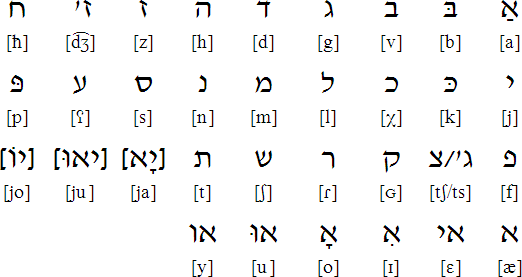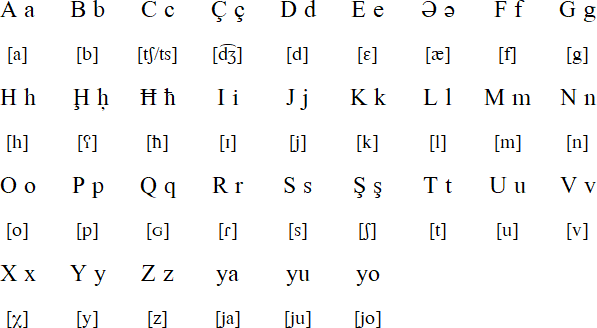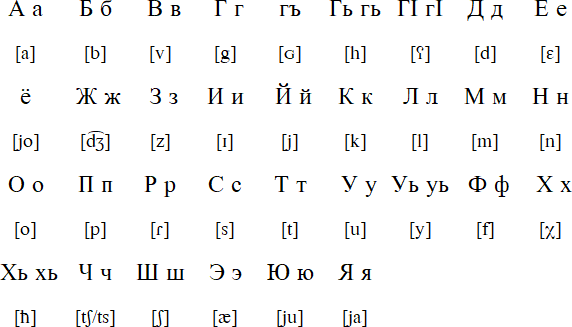Juhuri is a Southwest Iranian language originally spoken by Jews in the eastern Caucasus Mountains. It now mainly spoken in Israel, and in Azerbaijan, Dagestan in Russian, and the USA. It is also known as Juwuri or Judeo-Tat, and has about 100,000 speakers.
Juhuri is closely related to Tat, a language spoken by the Muslim Tats of Azerbaijan, and quite closely related to Persian. Juhuri contains numerous loanwords from Hebrew, Aramaic and Arabic.
The first books in Juhuri were printed in a version of the Hebrew script similar to Rashi and were published in 1908 and 1909. From 1929 to 1939 a version of the Latin alphabet was used to write Juhuri, and since then the Cyrillic alphabet has been used. In recent years the Hebrew script was started to become popular once again for writing Juhuri.



Download an alphabet chart for Juhuri (Excel)
Bisdo gof Adonoy əkin Yuno kuk Amitay və gufdi vəxiz bura ə Ninvi ə kəıə šəkər və noviyəti sox ə tovun ənuho čünki bədihoy ənuho vəromorət ə pušoy mə ommo vəxüšd Yuno əri virixdə ə Taršiš əz pušoy Adonoy furomo ə Yəfo ofd gəmirə ə Taršiš rafdənbuhorə do müzd rəħrə və furomo ə gəmi əri rafdə ə uhorəvoz ə Taršiš əz pušoy Adonoy.
It became speech of God to Jonah son of Amittai and He said "arise, go to Nineveh, to the big city " and prophecy about them. For they badness arose before me but he arose, Jonah, and escaped to Tarshish from before God. He wend down to Jaffa, he found the ship exactly the one which to Tarshis. He paid the payment of the rout and he went down so that to go with them to Tarshish from before God.
Source: Juhuri / Judeo-Tat(i) / the Language of the Mountain Jews. By Dan Shapira (2021).
Sample text provided by Jin Wei Hii
Information about Juhuri | Numbers | Proverbs
Information about Juhuri
http://en.wikipedia.org/wiki/Juhuri_language
http://www.trilinguist.ru/linguistic/juhur/index-12-23-04-42-05.html
http://www.trilinguist.ru/linguistic/juhur/phonetic.html
http://www.haaretz.com/weekend/week-s-end/saving-another-dying-jewish-language-before-it-s-too-late-1.284542
Avestan, Bactrian Baluchi, Bartangi, Dari, Gilaki, Hazaragi, Ishkashimi, Judeo-Persian, Juhuri, Khufi, Kumzari, Kurdish, Luri, Mazandarani, Munji, Ossetian, Ormuri, Oroshor, Persian, Parthian, Pashto, Rushani, Sanglechi, Sarikoli, Shabaki, Shughni, Tajik, Talysh, Tat, Wakhi, Wanetsi, Yaghnobi, Yazghulami, Yidgha, Zazaki
Adamaua Fulfulde, Afrikaans, Arabic (Algerian), Arabic (Bedawi), Arabic (Chadian), Arabic (Egyptian), Arabic (Gulf), Arabic (Hassaniya), Arabic (Hejazi), Arabic (Lebanese), Arabic (Libyan), Arabic (Modern Standard), Arabic (Moroccan), Arabic (Najdi), Arabic (Sudanese), Arabic (Syrian), Arabic (Tunisian), Arwi, Äynu, Azeri, Balanta-Ganja, Balti, Baluchi, Beja, Belarusian, Bosnian, Brahui, Chagatai, Chechen, Chittagonian, Comorian, Crimean Tatar, Dargwa, Dari, Dhatki, Dogri, Domari, Gawar Bati, Gawri, Gilaki, Hausa, Hazaragi, Hindko, Indus Kohistani, Kabyle, Kalkoti, Karakalpak, Kashmiri, Kazakh, Khowar, Khorasani Turkic, Khwarezmian, Konkani, Kumzari, Kurdish, Kyrgyz, Lezgi, Lop, Luri, Maba, Maguindanao, Malay, Malay (Terengganu), Mandinka, Marwari, Mazandarani, Mogholi, Morisco, Mozarabic, Munji, Noakhailla, Nubi, Ormuri, Palula, Parkari Koli, Pashto, Persian/Farsi, Punjabi, Qashqai, Rajasthani, Rohingya, Salar, Saraiki, Sawi, Serer, Shabaki, Shina, Shughni, Sindhi, Somali, Soninke, Tatar, Tausūg, Tawallammat Tamajaq, Tayart Tamajeq, Ternate, Torwali, Turkish, Urdu, Uyghur, Uzbek, Wakhi, Wanetsi, Wolof, Xiao'erjing, Yidgha
Aramaic, Bukhori, Domari, Hebrew, Jewish Neo-Aramaic, Judeo-Arabic, Judeo-Persian, Juhuri, Knaanic, Ladino, Mozarabic, Yiddish, Yevanic
Abaza, Abkhaz, Adyghe, Aghul, Akhvakh, Akkala Sámi, Aleut, Altay, Alyutor, Andi, Archi, Assyrian / Neo-Assyrian, Avar, Azeri, Bagvalal, Balkar, Bashkir, Belarusian, Bezhta, Bosnian, Botlikh, Budukh, Bulgarian, Buryat, Chamalal, Chechen, Chelkan, Chukchi, Chulym, Chuvash, Crimean Tatar, Dargwa, Daur, Dolgan, Dungan, Enets, Erzya, Even, Evenki, Gagauz, Godoberi, Hinukh, Hunzib, Ingush, Interslavic, Itelmen, Juhuri, Kabardian, Kaitag, Kalderash Romani, Kalmyk, Karaim, Karakalpak, Karata, Karelian, Kazakh, Ket, Khakas, Khanty, Khinalug, Khorasani Turkic, Khwarshi, Kildin Sámi, Kili, Komi, Koryak, Krymchak, Kryts, Kubachi, Kumandy, Kumyk, Kurdish, Kyrgyz, Lak, Lezgi, Lingua Franca Nova, Lithuanian, Ludic, Macedonian, Mansi, Mari, Moksha, Moldovan, Mongolian, Montenegrin, Nanai, Negidal, Nenets, Nganasan, Nivkh, Nogai, Old Church Slavonic, Oroch, Orok, Ossetian, Pontic Greek, Romanian, Rushani, Russian, Rusyn, Rutul, Selkup, Serbian, Shor, Shughni, Siberian Tatar, Sirenik, Slovio, Soyot, Tabassaran, Tajik, Talysh, Tat, Tatar, Teleut, Ter Sámi, Tindi, Tofa, Tsakhur, Tsez, Turkmen, Tuvan, Ubykh, Udege, Udi, Udmurt, Ukrainian, Ulch, Urum, Uyghur, Uzbek, Veps, Votic, Wakhi, West Polesian, Xibe, Yaghnobi, Yakut, Yazghulami, Yukaghir (Northern / Tundra), Yukaghir (Southern / Kolyma), Yupik (Central Siberian)
Languages written with the Latin alphabet
Page last modified: 05.04.24
[top]
You can support this site by Buying Me A Coffee, and if you like what you see on this page, you can use the buttons below to share it with people you know.

If you like this site and find it useful, you can support it by making a donation via PayPal or Patreon, or by contributing in other ways. Omniglot is how I make my living.
Note: all links on this site to Amazon.com, Amazon.co.uk
and Amazon.fr
are affiliate links. This means I earn a commission if you click on any of them and buy something. So by clicking on these links you can help to support this site.
[top]